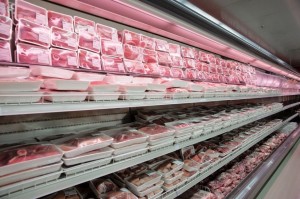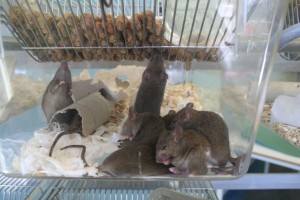Worldlog Semana 50 – 2014
Un estudio reciente del centro de investigaciones Chatham House lo ha vuelto a confirmar: si queremos detener el cambio climático, tenemos que comer menos carne. La industria cárnica internacional produce más gases de efecto invernadero que todos los coches, aviones, trenes y barcos juntos. Para evitar que el cambio climático alcance dimensiones catastróficas, tenemos que reducir drásticamente nuestro consumo de proteínas animales. Sin embargo, la demanda de carne global sigue creciendo con fuerza.
Por este motivo, la semana pasada he solicitado al Gobierno un debate para establecer políticas encaminadas a reducir el consumo de productos cárnicos y lácteos. Si todos los holandeses comieran carne un día menos por semana, el efecto sería el mismo que retirar de la circulación un millón de coches. Pulsa aquí para ver más información.
Holanda, como país exportador, realiza en este momento grandes esfuerzos comerciales para vender sus productos lácteos y cárnicos a las economías emergentes. Pero Holanda tiene también muchos conocimientos y experiencia para ayudar a esas mismas economías a protegerse contra los efectos de las inundaciones. ¿No sería mejor exportar soluciones climáticas en vez de problemas?
A día de hoy, todavía no se han llevado a la práctica mociones ya aceptadas para prohibir el uso de distintos pesticidas agrícolas con efectos perjudiciales. Por eso, el Partido por los Animales ha presentado esta semana un plan de acción para retirar del mercado dichos pesticidas. Ya han firmado la petición más de 62.000 personas. El Gobierno ha prometido analizar la cuestión. Esperemos que tomen medidas concretas rápidamente…
¡Buenas noticias! Ahora que se acerca la Nochevieja, vuelve el debate sobre los fuegos artificiales. Al menos 20 municipios han anunciado ya la creación de zonas libres de fuegos artificiales en torno a, por ejemplo, hospitales y lugares con muchos animales. El Partido por los Animales sigue reclamando la prohibición absoluta de fuegos artificiales para uso particular.
Los fuegos artificiales no son la única tradición perjudicial para el medioambiente que hay en Holanda. Esta semana hemos pedido al Gobierno de forma explícita que se desestimule la costumbre de soltar globos durante la celebración de eventos. La secretaria de Estado se mostró receptiva a la propuesta. Los globos que se sueltan al cielo, y sus correspondientes cintas, acaban aterrizando en la naturaleza en forma de basura y contribuyen al aumento de la sopa de plástico en mares y océanos. Además, muchos animales los confunden con comida.
También he planteado preguntas parlamentarias sobre las diferentes políticas cinegéticas en las distintas provincias. La caza se regula actualmente por provincia, lo cual hace posible en algunos casos prácticas muy crueles con los animales. Por eso, he solicitado la inclusión de un régimen de protección más uniforme en la nueva Ley de la naturaleza, que entrará en vigor en Holanda el 1 de enero de 2015.
El año pasado se sometió a 450.000 animales a pruebas de manipulación genética, un incremento del 12,7 % con respecto a 2012. En 2013 se sacrificaron un total de 1,1 millón de animales. ¡Un exceso! Por eso, hemos solicitado una prohibición del uso de animales en pruebas de manipulación genética, lo cual es necesario para reducir el número de pruebas con animales. Diversos científicos han señalado que el 80 % de las pruebas con animales no cumplen los requisitos mínimos de una buena investigación. Por lo tanto, debemos acabar cuanto antes con todas estas pruebas.
¡Un saludo y hasta pronto!
Marianne
It was recently again confirmed by a research by think tank Chatham House: eating less meat is needed to stop climate change. Worldwide livestock farming emits more greenhouse gasses than all cars, aircrafts, trains and vessels put together. In order to prevent a catastrophic climate change, we need to reduce our consumption of animal proteins drastically. But the global demand for meat is still growing strongly.
Last week, during a debate on our climate I asked our government to establish a policy for reducing the consumption of meat and dairy products. If everyone in the Netherlands was to abstain from eating meat for one day a week, it would have the same effect as if we would take one million cars off the road. Click here for more information.
At this moment, the Netherlands, as an exporting country, is working hard on forcing its meat and dairy products on emerging economies, while the Netherlands has great knowledge to help countries to withstand floods. We should rather export climate solutions than climate problems!
Previously adopted motions to ban some harmful types of agrotoxics have not been carried out until now. For that reason, the Party for the Animals presented an action plan this week to take those toxics off the market. A petition asking for this has meanwhile been signed by more than 62,000 people. The government has promised to look at it again. Let’s hope they will soon take measures.
Good news! With new year’s eve coming soon, the issue of fireworks is very topical again. Already 20 municipalities have said to make fireworks free zones in the area of nursing homes and places where animals are kept among other locations. The Party for the Animals continues to support the ban on fireworks for private use.
Fireworks is not the only environmental harmful festive tradition in the Netherlands. This week we have called the government to actively discourage sending up balloons. The State Secretary said to be willing to do so. Balloons and ribbons end up as litter in the environment after they have been send up, contributing to the plastic soup in oceans and they are seen as food by animals.
I also asked parliamentary questions about the differences in hunting policies between the provinces. It’s arranged differently in each of the provinces, making the use of animal-unfriendly hunting methods possible in some of them. I have asked for more uniform conservation measures in the new Nature Law, starting on the 1st of January 2015.
Last year, 450,000 test animals were sacrificed for genetic engineering, an increase of 12.7 per cent in comparison to 2012. In total 1.1 million animals were killed in 2013. Much too many! That’s why we called for a ban on the genetic modification of animals. This is necessary to cut back the number of animal tests. Scientists have indicated that 80% of the animal tests fail to meet the basic conditions for good scientific research. Al these tests should be banned as soon as possible!
Until soon! Greetings, Marianne


